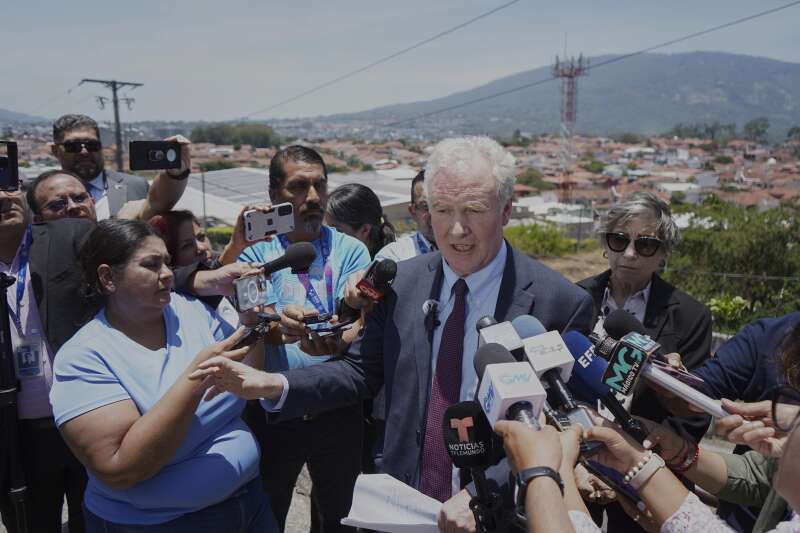U.S. Senator Chris Van Hollen of Maryland met Thursday evening with Kilmar Abrego Garcia, a Salvadoran man wrongfully deported from the United States despite a court order blocking his removal. The meeting marks a significant turn in a case that has become a lightning rod for legal, political, and diplomatic debate between Washington and San Salvador.
Van Hollen posted a photo on X (formerly Twitter) showing him speaking with Abrego Garcia in what appeared to be a local restaurant in El Salvador. The senator, who arrived in the country Wednesday, said the primary aim of his visit was to see Abrego Garcia in person.
“Tonight I had that chance,” Van Hollen wrote, adding that he had spoken with Abrego Garcia’s wife, Jennifer, in Maryland to share a message of love from her husband. He promised to provide a full update on the case upon returning to the U.S.
A Legal Error Acknowledged, But No Resolution
Abrego Garcia, a Salvadoran citizen and Maryland resident, was deported in March 2025 despite an immigration court order blocking the move. U.S. Immigration and Customs Enforcement (ICE) later acknowledged the deportation was an “administrative error.” But neither the U.S. nor Salvadoran governments have acted to repatriate him.
While the Trump administration has labeled the deportation a mistake, it continues to resist calls to bring Abrego Garcia back. President Trump and Salvadoran President Nayib Bukele have both stated there is no basis for his return—even as the U.S. Supreme Court and a federal appeals court push for the administration to facilitate it.
Abrego Garcia remains detained inside El Salvador’s maximum-security Terrorism Confinement Center (CECOT), where over 200 other deportees—many of them Venezuelan—are being held, accused of gang affiliation by U.S. authorities.
El Salvador’s presidential office released a statement shortly before Van Hollen’s post, confirming the meeting had taken place and claiming Abrego Garcia had been “confirmed healthy” and would remain in El Salvador’s custody. The statement ended with U.S. and Salvadoran flag emojis, joined by a handshake symbol.
Partisan Divide and Legal Showdown
Abrego Garcia’s case has drawn sharp partisan reactions. Democrats, including Van Hollen, have condemned the deportation as a gross violation of due process. The 4th U.S. Circuit Court of Appeals on Thursday described the administration’s refusal to return Abrego Garcia as “shocking,” and criticized what it called “constant intimations of [judicial] illegitimacy” from the executive branch.
Judge J. Harvie Wilkinson III, a Reagan appointee, wrote in a blistering opinion that he hopes the executive branch still believes in “the rule of law as vital to the American ethos.”
Meanwhile, Republicans have praised the deportation, portraying it as part of broader efforts to combat crime. West Virginia Rep. Riley Moore and Missouri Rep. Jason Smith visited the CECOT prison recently, backing President Trump’s crackdown on immigration and gang violence.
Moore said the prison “houses the country’s most brutal criminals,” while Smith posted online that “thanks to President Trump,” the facility now detains “illegal immigrants who broke into our country and committed violent acts.”
The Trump administration alleges that Abrego Garcia has ties to the MS-13 gang. However, his attorneys say no evidence has ever been presented, and he has never been charged with any gang-related activity.
Denied Access, But Not Deterred
Before meeting with Abrego Garcia, Van Hollen was denied entry into CECOT. He told reporters his vehicle was stopped at a checkpoint about two miles from the prison, while other cars were allowed to proceed. “They stopped us because they are under orders not to allow us to proceed,” the senator said during a press conference in San Salvador.
Earlier in the day, Van Hollen also met with Salvadoran Vice President Félix Ulloa, who reiterated his government’s stance that Abrego Garcia would not be returned to the U.S.
In Maryland, Jennifer Vasquez Sura, Abrego Garcia’s wife, expressed both hope and anxiety in a statement released through an advocacy group. “We still have so many questions, hopes, and fears,” she said.
Ongoing Fallout
Legal advocates and human rights organizations continue to monitor Abrego Garcia’s case, warning that it may set a dangerous precedent. El Salvador’s prison system, especially CECOT, has been accused of torture and abuse by international watchdogs—allegations the Bukele administration denies.
The case also reflects larger tensions around immigration enforcement, executive overreach, and international human rights obligations.
While Van Hollen’s visit brings renewed attention, the path forward for Abrego Garcia remains uncertain. More Democratic lawmakers are reportedly planning visits to El Salvador in the coming weeks, hoping to pressure both governments into resolving the case.
For now, the fate of one man continues to expose the fissures in American immigration policy and its ripple effects abroad.



